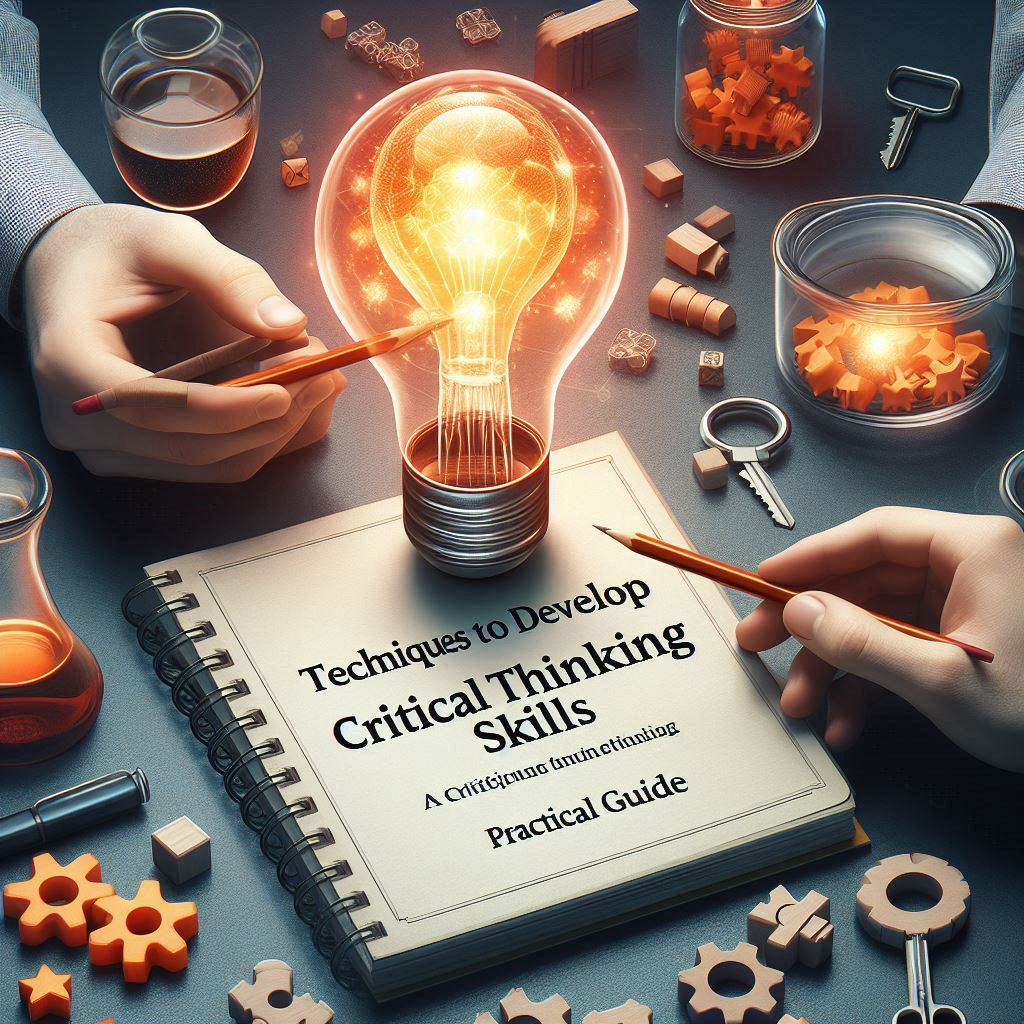Psychologhy
Analysis, Critical Thinking Skills, Evaluation, improve, Inference, Intellectual, Practical, Thinking
Zephyros
10 months ago
0 Comments
How to Develop Critical Thinking Skills: A Step-by-Step Guide to Intellectual Growth
Critical thinking is an essential skill for anyone aiming to succeed in today’s fast-paced, information-rich world. Whether you’re a student, a professional, or someone dedicated to self-improvement, learning how to think critically can empower you to analyze situations more effectively, solve problems creatively, and make better decisions. But what exactly is critical thinking, and how can you cultivate this vital skill?
In this comprehensive guide, we’ll explore what critical thinking is, why it’s important, and the practical steps you can take to develop strong critical thinking abilities.
What is Critical Thinking? Understanding the Core Principles
Critical thinking is the ability to think clearly, rationally, and independently, using logic and reason to evaluate information and arguments. It involves questioning assumptions, recognizing biases, and considering different perspectives before arriving at a well-reasoned conclusion.
Key Components of Critical Thinking
- Analysis: Breaking down complex information into smaller, manageable parts to understand it better.
- Evaluation: Assessing the credibility and relevance of information, data, or arguments.
- Inference: Drawing logical conclusions based on available evidence.
- Problem-Solving: Using analytical and creative thinking to address challenges.
- Open-Mindedness: Willingness to consider alternative viewpoints and evidence.
- Reflection: Continuously evaluating your thought process to improve over time.
Now that we understand the core components of critical thinking, let’s delve into the practical techniques for improving these skills.
Why Critical Thinking is Important for Personal and Professional Growth
Critical thinking enhances your ability to navigate complex problems, make informed decisions, and approach life’s challenges with a level-headed perspective. Here’s why developing critical thinking is crucial:
- Better Decision-Making: By thoroughly evaluating options, critical thinkers are more likely to make well-reasoned decisions.
- Improved Problem-Solving: Critical thinking equips you to tackle challenges with innovative solutions, whether in your personal life or at work.
- Enhanced Communication: Clear, logical thinking helps you articulate your ideas effectively and understand others better.
- Career Advancement: In a competitive job market, employers value critical thinkers who can analyze complex problems and offer strategic insights.
- Informed Citizenship: Critical thinkers are better equipped to engage in meaningful debates, make informed choices, and contribute to society.
Techniques to Develop Critical Thinking Skills: A Practical Guide

1. Question Your Assumptions: Cultivating an Inquisitive Mindset
The first step in developing critical thinking is learning to question your assumptions. Many of our thoughts, beliefs, and decisions are based on underlying assumptions we take for granted. By questioning these assumptions, you open yourself to alternative perspectives and solutions.
How to Practice Questioning Assumptions:
- Ask Why: When confronted with a belief or decision, ask yourself, “Why do I think this is true?” or “Why do I believe this is the best option?”
- Challenge Norms: Regularly question societal or cultural norms. Why are certain behaviors accepted, and are there better alternatives?
- Embrace Curiosity: Cultivate a habit of asking deeper questions about everything, from daily routines to global issues.
2. Analyze Information Objectively: Sorting Facts from Opinions
One of the hallmarks of critical thinking is the ability to distinguish between facts and opinions. In an age where misinformation spreads rapidly, it’s crucial to analyze the information you encounter objectively.
Steps to Analyze Information Critically:
- Identify the Source: Consider where the information is coming from. Is the source reputable and credible?
- Check for Biases: Evaluate whether the information is presented in a biased or objective manner.
- Verify with Multiple Sources: Don’t rely on a single source of information. Cross-check facts with multiple, independent sources before forming conclusions.
3. Develop Logical Reasoning: Strengthening Analytical Skills
Logical reasoning involves using structured thinking to arrive at conclusions. Critical thinkers must be able to follow logical steps to evaluate arguments and solve problems systematically.
Ways to Practice Logical Reasoning:
- Identify Logical Fallacies: Familiarize yourself with common logical fallacies (e.g., ad hominem, straw man) and practice spotting them in everyday conversations or media.
- Use If-Then Statements: Start using “if-then” reasoning in problem-solving scenarios. For example, “If this strategy fails, then what would be the alternative solution?”
- Practice Deductive and Inductive Reasoning: Engage in exercises that involve deductive (starting from general principles to specific conclusions) and inductive reasoning (building generalizations based on specific observations).
4. Embrace Open-Mindedness: Understanding Different Perspectives
A critical thinker must be open to hearing and considering alternative viewpoints. Being open-minded doesn’t mean agreeing with every opposing view, but it involves listening to and evaluating different perspectives before making decisions.
How to Foster Open-Mindedness:
- Listen Actively: When engaged in conversations, focus on truly understanding the other person’s viewpoint without immediately forming counterarguments.
- Suspend Judgment: Avoid jumping to conclusions or making snap judgments. Give yourself time to reflect on what you’ve heard.
- Engage with Diverse Perspectives: Regularly expose yourself to different cultures, ideologies, and disciplines. This broadens your understanding and helps you appreciate different ways of thinking.
5. Apply Problem-Solving Techniques: A Systematic Approach
Critical thinking is closely tied to effective problem-solving. Instead of rushing to the first solution, develop a systematic approach that involves defining the problem, brainstorming potential solutions, evaluating them, and implementing the best one.
Steps to Enhance Problem-Solving Skills:
- Define the Problem Clearly: Break down the problem into smaller parts and define each element. Ask yourself, “What exactly is the issue I need to address?”
- Generate Multiple Solutions: Don’t settle for the first idea that comes to mind. Challenge yourself to come up with at least three to five potential solutions.
- Evaluate Solutions: Weigh the pros and cons of each solution and consider the long-term impact before making a decision.
- Reflect on the Outcome: After solving a problem, take time to reflect on the outcome. What worked well? What could have been done better?
6. Practice Reflection: Continuous Self-Evaluation
Reflection is a powerful tool for developing critical thinking skills. Regularly evaluate your own thought processes, decisions, and actions. Self-reflection helps you identify areas for improvement and refine your cognitive abilities over time.
Techniques for Reflection:
- Journaling: Keep a critical thinking journal where you reflect on your decisions, thought processes, and any cognitive biases you may have identified.
- Seek Feedback: Ask trusted colleagues, mentors, or friends for feedback on your thought processes. Sometimes, an external perspective can reveal blind spots.
- Set Aside Time for Reflection: Make it a habit to dedicate time each week to reflect on your experiences, decisions, and intellectual growth.
Long-Term Benefits of Developing Critical Thinking Skills

Enhanced Cognitive Abilities
Practicing critical thinking not only improves your decision-making but also strengthens your overall cognitive abilities. Over time, you’ll become better at processing complex information, recognizing patterns, and thinking more creatively.
Greater Emotional Intelligence
Critical thinking is closely linked to emotional intelligence. By reflecting on your own thought processes and biases, you become more self-aware and empathetic, which enhances your ability to communicate and build strong relationships.
Success in Professional Life
Employers highly value critical thinkers who can analyze data, generate innovative ideas, and solve problems independently. By cultivating this skill, you’ll increase your career prospects and stand out in any industry.
Informed Participation in Society
Critical thinkers contribute meaningfully to society by making informed choices, engaging in thoughtful discussions, and advocating for well-reasoned solutions to social issues. Developing critical thinking skills allows you to be a more informed and active citizen.
Conclusion: Building Critical Thinking Skills for Lifelong Growth
Critical thinking is an invaluable skill that serves as the foundation for intellectual and personal growth. By questioning assumptions, analyzing information objectively, practicing logical reasoning, and fostering open-mindedness, you can enhance your ability to think critically and make better decisions. Incorporating problem-solving techniques and reflection into your daily routine will further sharpen your cognitive skills, setting you up for long-term success.
The journey to developing critical thinking takes time and practice, but the rewards are well worth the effort. Start applying these techniques today, and you’ll soon notice a significant improvement in your analytical abilities, decision-making, and overall cognitive growth.














Post Comment